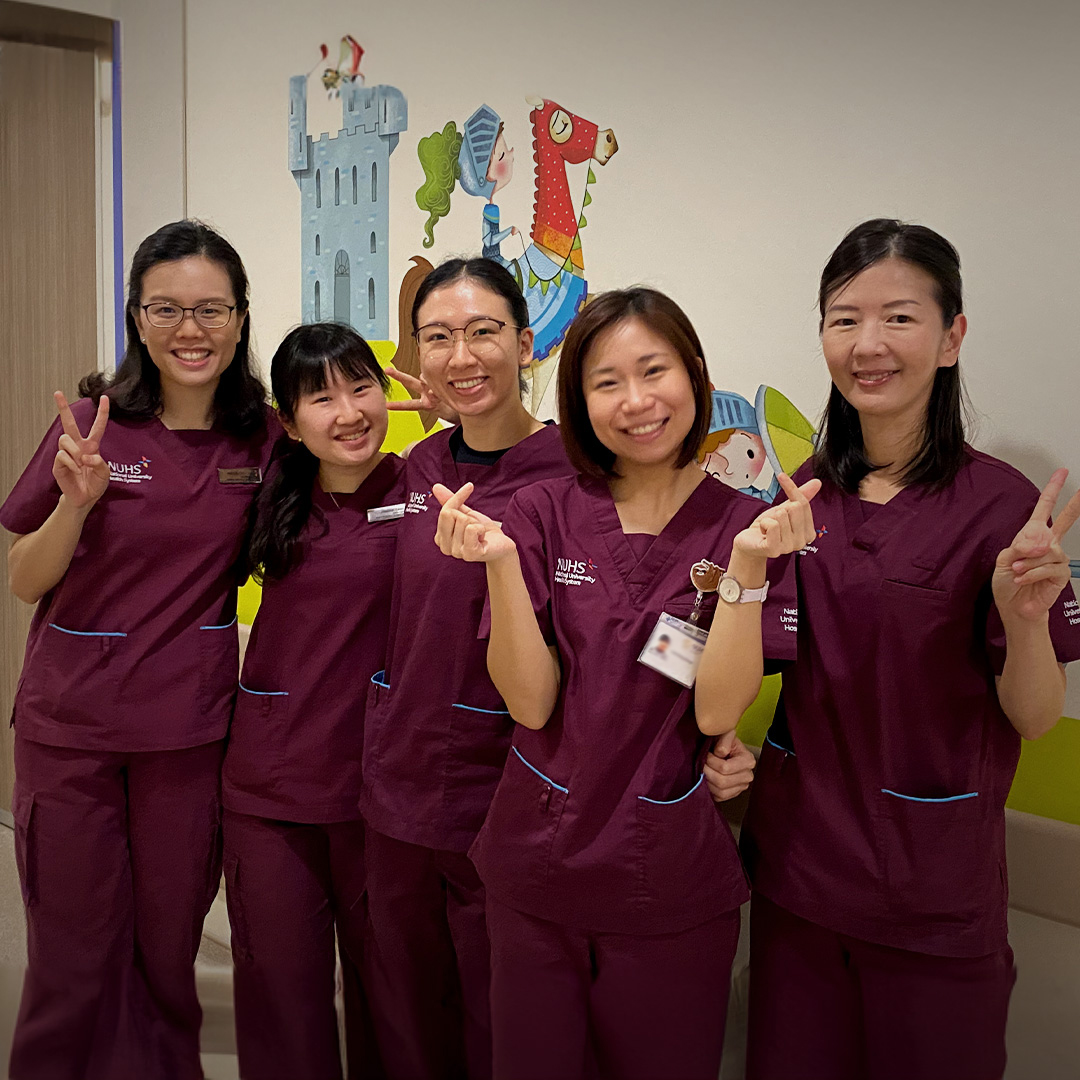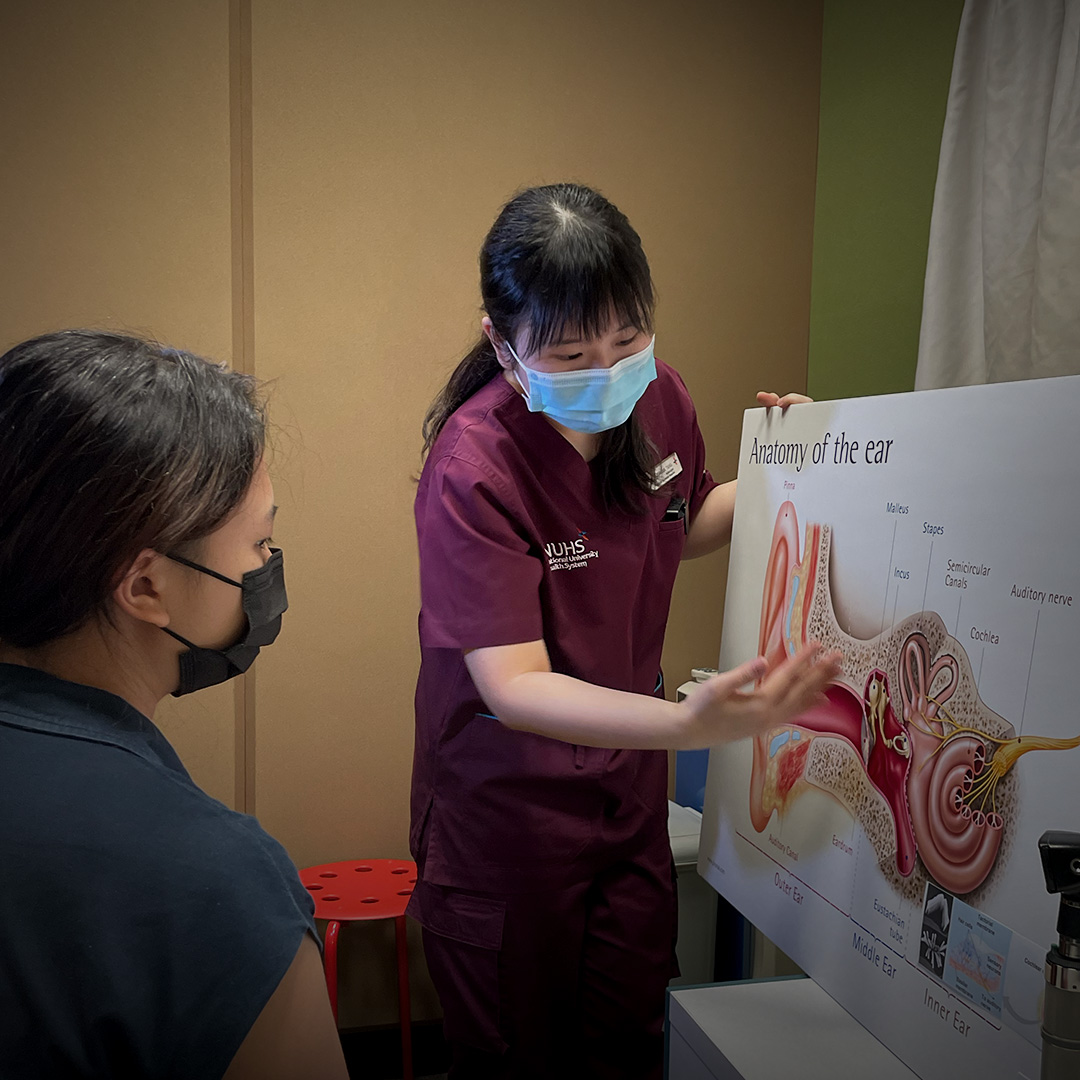Joanna's first brush with the field of audiology occurred during a job shadowing experience at Changi General Hospital (CGH) and Cerebral Palsy Alliance Singapore (CPAS).
At CGH, she observed how audiologists provided follow-up care to patients with hearing aids and those experiencing tinnitus.
During her stint with CPAS, she watched how audiologists worked with children with cerebral palsy – a condition caused by abnormal brain development or brain injury, leading to impaired motor control.
Looking back, Joanna recalls how her past experiences sparked a passion in her for the field of audiology.
"My job shadowing experience showed me that audiology goes beyond just managing patients on their hearing rehabilitation journey, but it can be vibrant and challenging as no two patients are ever the same."
Joanna has since treated patients of all ages and from all walks of life. From hearing loss to tinnitus and long-term rehabilitation, she has built up a wealth of experience that she incorporates in her day-to-day role as an audiologist.
 Joanna and her colleagues at NUH.
Joanna and her colleagues at NUH.
As part of her role, Joanna works with patients who have been diagnosed with tinnitus by an ear, nose, and throat doctor.
Tinnitus is the perception of one or more phantom sounds (e.g. ringing, hissing, or buzzing) that has no external sound source. It varies greatly between each patient in terms of the characteristic of the sound, its possible causes, factors that may worsen it, and one's emotional reaction to the tinnitus.
There are millions of people worldwide who experience tinnitus, but only a small minority suffer because of it. Those who suffer from their tinnitus may proceed to seek medical attention.
"When I first meet with a patient, I try to understand them by taking into account factors like their beliefs, concerns, medical history, lifestyle, support system and social factors. I then use this information to develop educational materials and treatment plans that best suit them (the patient)."
As a naturally creative person, Joanna enjoys creating illustrations to help educate her patients. Coupled with her latitude to customise treatments, this allows Joanna to better engage with those under her care.
 Joanna teaching a patient about the anatomy of the ear
Joanna teaching a patient about the anatomy of the ear
She also makes use of techniques such as sound therapy to help patients gain relief and control over this distressing symptom. Each treatment plan she devises is highly individualised and tailored to the patient's unique needs and medical history.
This may involve various forms of sound therapy, and auditory stimulation (e.g. via hearing aids), as well as education and counselling to help patients better understand and manage their symptoms to improve their quality of life.
When underlying issues such as anxiety, depression and/or insomnia which might exacerbate tinnitus are identified, Joanna will help refer patients to psychologists or psychiatrists for specialised care. This holistic approach ensures that the physiological and psychological aspects of the condition are addressed.
However, as with any role, Joanna is prepared to deal with challenging patients occasionally.
She shares, "When they first visit me, patients tend to be anxious, scared or frustrated, and this can sometimes result in them lashing out as a result of their previous experiences before seeing me."
"I've dealt with verbally abusive patients and family members who exhibit unreasonable behaviours."
But for Joanna, this is all part of the job, and she is equipped with the expertise to handle such situations. The crucial role she plays as an AHP remains – caring for her patients.
She says, "As a healthcare professional, it is important that we empathise with our patients and understand their feelings and concerns."
Caring for your hearing
As an audiologist, Joanna strongly believes that it is essential to protect your hearing. She shares some tips:
1. Avoid exposure to high levels of sounds (including music and noise)
Long or repeated exposure to high levels of sounds (e.g. listening to sounds at 85 decibels/dBA for over 8 hours at a time) can cause damage to your hearing. Remember: the higher the sound level, the shorter the time it takes to start to cause hearing damage.
For those who regularly use earphones or earbuds, ensure that the volume of your devices do not exceed 60% of the maximum level.
2. Make use of hearing protection
If your job regularly exposes you to high levels of sound from machinery or power tools, use hearing protection such as earmuffs or ear plugs, or both, for further protection. When attending concerts where there is loud music, you can also consider using musician's earplugs that allows you to enjoy the music but at a safer lower sound level. These will protect your hearing and reduce the chances of developing tinnitus.
3. Maintain good health
Not many people may be aware, but chronic health conditions like high blood pressure, high cholesterol, and diabetes may indirectly impact one's hearing. These conditions can restrict blood flow to the inner ear, which can lead to hearing issues over time. It is thus important to ensure that you have these conditions well-managed or under control.
4. There is no need to clean your ears
The ear is self-cleaning and attempting to remove earwax manually may be dangerous. Using cotton buds to "dig" your ears will only push the earwax deeper. It also puts you at risk of damaging your eardrums, which can cause hearing loss.
There is a common misconception that cotton buds are used to clean your ears when they are not. In fact, most cotton buds are packaged with a safety label that warns customers not to insert them into their ears.
5. Learn how to recognise the symptoms of hearing loss
Knowing when you have an issue with your hearing is also important and improves the odds of successful intervention. So, keep an eye out for the following symptoms:
- Others say you speak loudly, but you do not think so
- Voices sound unclear to you, even in quiet settings
- You often misunderstand numbers and words during conversation
- You frequently ask others to repeat themselves
- It is difficult to hear in noisy places when others who are next to you do not experience the same
- You often increase the volume on TV or devices
For more information on Audiology, check out this TikTok video that features Joanna!
MOH Holdings (MOHH) is offering scholarships to nurture the next generation of nursing, pharmacy and allied health professionals. These scholarships are in partnership with public healthcare institutions and allow you to study in local and overseas universities. For more details on the health science disciplines (including Audiology) offered, check out the
Healthcare Graduate Studies Award.